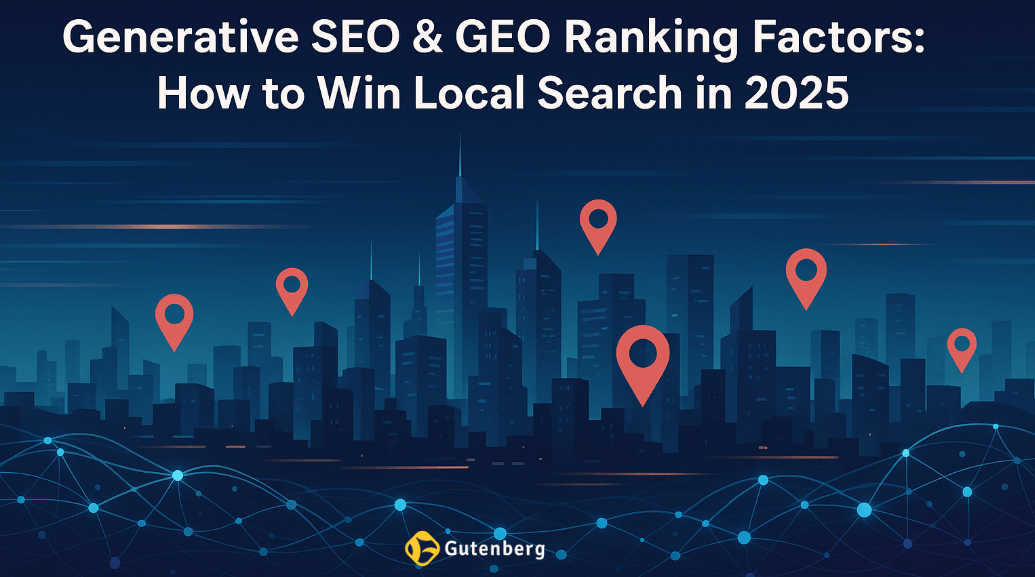Search visibility is no longer driven solely by keywords, backlinks, or on-page content. In recent years, search engines have grown far more context-aware, and one of the most important dimensions they’re factoring in is geography.
Where a user is searching from can dramatically influence what results they see. The same search term, typed by two people in different cities, may lead to completely different results. That’s not an accident. It’s Generative Engine Optimization (GEO) at work.
In this blog, we’ll explore:
- What GEO (Generative Engine Optimization) means in SEO today
- How geo ranking factors are shaping visibility
- Why location signals are now a critical SEO layer
- Practical steps to optimize your site for geographic signals SEO
- Tools to track and measure geo-based search results
What is GEO in Search Visibility?
GEO (Generative Engine Optimization) refers to the growing role of location-based signals in shaping how content ranks. It’s not just about whether the content is good. It’s about whether it’s contextually relevant to a specific place.
Search engines today collect and interpret a wide range of geographic signals SEO considers essential. These include:
- User IP address to identify the user’s location
- GPS data from mobile devices
- Search history and preferences based on regional activity
This layer of location filtering has become an invisible but powerful gatekeeper. Even if your content is optimized in every traditional way, it may remain unseen if it doesn’t align with the user’s local context.
Why GEO is the New Layer of SEO
Traditional Search Engine Optimization methods focus on keyword density, site speed, and technical SEO. But search personalization has grown more nuanced. GEO has introduced a new, subtle layer that brings a location-first lens to relevance.
AI in local search now enables real-time content ranking adjustments based on geographic context, user intent, and mobile behavior—making Generative Engine Optimization more dynamic and precise.
Let’s say someone searches for “best IT consulting services.” A person in Austin will see different results than someone in San Jose, even if both queries are identical. That’s because geo ranking factors like IP and local content presence now play a bigger role.
This shift is especially relevant in industries like SaaS, healthcare, legal, and retail, where regional SEO strategies influence visibility and trust. A business with great content may still miss out if it doesn’t meet the geo-based search results threshold.
Key GEO Ranking Factors
1. IP Location:
Search engines assess the IP address of users to identify where the search is coming from. This shapes everything from search suggestions to the results shown.
Action tip: Businesses must assess if their content performs well across different regions. If not, consider adapting the content or creating local variants.
2. Google Business Profile:
For any business with a physical location, Google Business Profile is non-negotiable. It’s critical for appearing in geo-based search results, especially maps.
Action tip: Keep your NAP (Name, Address, Phone) consistent across platforms and regularly update business hours, services, and reviews.
3. Local Backlinks:
Search engines weigh backlinks differently based on their origin. Links from local directories, blogs, or news outlets send stronger geographic signals SEO wise than generic high-authority sites.
Action tip: Build relationships with regional publications, chambers of commerce, and niche blogs tied to your target areas.
4. Language and Country Targeting:
Multinational sites often need tags to ensure content is served correctly in different regions. This avoids confusion and helps align the site with regional SEO strategies.
Action tip: Use Google Search Console settings to specify country targeting. Ensure all language versions are fully localized.
5. Mobile Search Behavior:
Mobile has become the default. And mobile-first behavior has pushed proximity-based SEO into the spotlight. Local queries like “near me” are contextually tied to GPS and location permissions.
Action tip: Make sure mobile experience is seamless. Short load times, map integrations, and tap-to-call features are now essential for mobile-first local SEO.
How to Optimize Your Website for GEO Signals
Once you’re aware of the geo ranking factors, the next step is aligning your site to meet those signals. Here’s how.
- Create Location-Specific Landing Pages: Build unique content for each city or state you target.
- Add Schema Markup: Use LocalBusiness and GeoCoordinates to highlight your geographic relevance.
- Use a CDN (Content Delivery Network): Improve content load speeds regionally to enhance user experience.
- Optimize Metadata and URLs for Location: Include geographic keywords in titles, meta descriptions, and slugs.
- Tailor Content to Local Interests: Add region-specific references and examples to reinforce local trust signals.
Tools to Track GEO Performance
- Google Search Console: Track visibility by region with location filters.
- Ahrefs / Semrush: Monitor keyword performance across locations.
- BrightLocal / Local Falcon: Use heatmaps to measure geo-based search results.
- VPNs and SERP Simulators: Mimic location-specific searches to view local rankings.
Why GEO Needs to Be Part of Your SEO Strategy
The evolution of search has made GEO (Generative Engine Optimization) a non-optional consideration for marketers and content teams. Focusing only on broad tactics in Search Engine Optimization will limit visibility, especially where geo ranking factors now act as gatekeepers.
By understanding how geographic signals SEO works, businesses can take control of their regional SEO strategies, improve local visibility, and prevent content from being filtered out in key regions.
Partner with Gutenberg for Smarter GEO Optimization
Many businesses are still optimizing a version of SEO that no longer fully applies. At Gutenberg, we help marketing teams integrate Generative Engine Optimization into their strategy with data-backed, geography-aware planning.
Whether you’re targeting city-specific visibility, improving mobile-first local SEO, or mapping content to regions, our SEO programs are designed to reflect how search really works today. Our teams combine technical SEO, content strategy, and local signal management to help brands appear in the right searches, and in the right places.
If search visibility matters to your business, let’s make sure you’re showing up where it counts.
Final Thoughts
- Run a geo audit using Google Search Console and BrightLocal
- Build location-specific content for each key region
- Claim and maintain your Google Business Profile with updated info
- Add local schema and optimize mobile experience to support proximity-based SEO
- Track rankings by geography to understand where improvements are needed
Ignoring GEO means ignoring how users are seeing your site. This new layer of SEO is already influencing discovery. It’s time to act on it before competitors do.
Frequently Asked Questions
- What is Generative Engine Optimization in SEO?
It refers to optimizing content for location-based and context-aware ranking signals beyond traditional SEO. - How do geo ranking factors impact search results?
They personalize results using IP, GPS, and local backlinks, shaping who sees your content. - What are some examples of geographic signals SEO considers?
Device location, Google Business listings, and local citations. - How can I improve visibility in geo-based search results?
Through regional content, schema, local backlinks, and mobile-first local SEO. Gutenberg helps build these strategies. - Is mobile-first local SEO different from regular local SEO?
Yes, it emphasizes fast mobile experience and real-time GPS relevance. - Do regional SEO strategies work for national businesses?
They do. Gutenberg supports multi-location SEO for consistent but local-first visibility. - What tools help monitor GEO performance?
Google Search Console, BrightLocal, and VPN tools help analyze geo ranking factors across locations. Gutenberg offers performance monitoring as part of SEO programs.
















